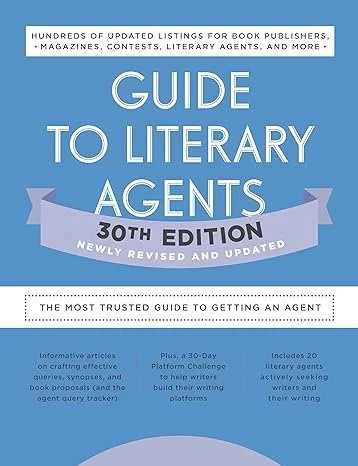You’ve got the passion, you’ve got the talent, you’ve got the dedication … and you’ve got the manuscript to show for it.
The one thing you don’t have? A book deal.
Many authors think that writing a book is the biggest hurdle—until they try to get their book published, that is. It’s not easy to do on your own, which is why many writers look for a literary agent.
But if you’re a first-time author, you may be totally lost as to how to secure representation. Fortunately, this guide has you covered with all the nitty-gritty details about how to get a literary agent.
Step 1: Scan through Agent Listings
Finding the right agent is a little like online dating. There are thousands of options out there, but it’s not as easy as just picking out the one that looks the best. You and your agent should be a good match for one another, so it may take some time to find the right one.
To start your search, scan through agent listings online and/or in print. Narrow down your search according to genre or category to locate the right agent to represent you and your work. Here are a few of the top tools for finding a literary agent:
Publishers Marketplace: This site may not look particularly impressive, but it’s considered one of the top spots to find a literary agent. It hosts thousands of listings for agents actively seeking new clients across a range of genres.
AgentQuery.com: This free database includes hundreds of detailed profiles to help you to find the right agent for your book.
Query Tracker: This site’s database isn’t quite as large, but it includes some really helpful tools for organizing and tracking your queries.
Association of American Literary Agents: This small database features agents with proven sales track records.
Guide to Literary Agents: This guide is available in print and includes listings for agents along with those for publishers, awards, and contests. Just be sure to get the most up-to-date copy of this guide to avoid searching through incorrect listings.
Writer Beware: This website lists agents and publishers that have been identified as illegitimate. It can be a helpful resource for making sure you don’t fall for one of the many scams that unfortunately exist in the book industry.
Step 2: Write Your Query Letter
You can think of a query letter for a literary agent as being similar to a cover letter with a job application. If you want to stand out, your letter absolutely cannot follow a standard template. Instead, you need to pour your heart into the letter and really make a strong case for your book.
In order to get your foot in the door, you’ll have to reel in potential agents and make a great impression quickly. Without an engaging query letter, it’s unlikely that agents will take a look at your manuscript.
There’s no formula for crafting the ideal letter. However, it’s always a good idea to get help writing your query letter, especially if you’ve never been published before. Remember that each submission should be tailored to the agent you’re submitting to. In addition, you should try to limit your query letter to one page, so make sure every word counts.
Step 3: Follow the Submission Guidelines
Next up is putting together a package to present your book to potential agents. For most submission packages, you’ll need a:
Query letter
Synopsis of your book
Sample from your manuscript
Make sure you carefully review each agent’s submission guidelines. This step could make or break your chances with an agent! Each one has detailed requirements, which may include a certain number of manuscript pages or chapters, a specific word in an email subject line, adding the manuscript in the body of the email rather than an attachment, or including a self-addressed stamped envelope for snail mail submissions.
Some agents request a book proposal for nonfiction writing, which typically includes a:
Cover letter
Synopsis
Table of contents
Summary of each chapter
Sample chapter
Market analysis
Author bio
Again, it’s incredibly important to follow these submission guidelines exactly as written. If you fail to follow the agent’s submission package instructions, it’s very likely that your submission will be tossed out.
One thing to note, however, is that there should not be a fee requested as part of your submission package. You can disregard agents who include a payment requirement upfront—legitimate agents make money when they place your manuscript with a publisher.
Step 4: Track the Responses
It’s like Tom Petty sang: “The waiting is the hardest part.” It may take a little time for the responses from literary agents to start rolling in, so try your best to be patient.
And remember—you do not have to wait to hear back from one agent before you submit to another. You can send out dozens of queries at once and wait to see whom you hear back from. In fact, it’s wise to create a spreadsheet with the details for each of your submissions.
When you do start hearing back from agents, keep track of their responses:
Rejection: Rejections are always difficult, but that doesn’t mean there isn’t a great agent out there for you. Make a note of the rejection so you don’t accidentally resubmit to the same agent.
Acceptance: It can be quite tempting to go with the first offer you receive, but you need to carefully consider the agent’s proposal before moving forward. Respond promptly to let the agent know you’re reviewing the offer, but don’t feel like you need to make a decision right away.
No reply: Unfortunately, many agents don’t bother getting back to every author that submits a query. You can send a short email to follow up after two months or so go by with no response, but if you still don’t hear anything after another month, you can assume it’s a rejection.
Chicken Soup for the Soul was rejected 144 times…
Step 5: Choose a Literary Agent
Keep track of the details of each offer you receive from a literary agent. You’ll want to compare these offers in detail to determine the best fit for you and your book.
Select your agent very carefully. This person will essentially be acting as the business manager for your book, so it’s important to make sure you’re getting a fair deal and that you and the agent are on the same page. Don’t rush the decision just because you’re dying to see your book on store shelves.
Do I Need a Literary Agent?
After reading about all the work that goes into getting an agent, you might be wondering whether you actually need one at all. Many publishers accept submissions without an agent, which leads authors to believe that an agent isn’t necessary. However, countless manuscripts end up on the slush pile, where they either linger for months, get quickly reviewed by a junior editor, or possibly get tossed before anyone gets past the title page.
This doesn’t always happen, of course, but it’s more common than you might think—especially for fiction writers. In fact, the type of book you’re writing is the biggest factor in whether you need an agent. Just about all fiction writers who want to be published need a literary agent. In addition, some nonfiction writers do as well, especially those who are writing a memoir, biography, self-help book, or any other type of title that might be sold in a major bookstore.
If you’re in a more niche genre, such as poetry, academic, professional, educational, or technical writing, you may not need a literary agent. Identify a specific market for your book in your proposal to improve your odds of publishing success without representation.
Benefits of Having an Agent for Your Book
There are a number of reasons that writers spend countless hours submitting their work to agents. Having one of these industry professionals on your side comes with some serious advantages. Although it might take time to find the right literary agent, it’s well worth the effort for most authors.
Think of it as a partnership. You wouldn’t choose someone willy-nilly.
The following are some of the main benefits that come with having an agent for your book:
You get your foot in the door. Agents have contacts within the publishing industry that allow them to make sure your book is submitted to the right places and seen by the right people. This is especially important for debut fiction writers since many publishers won’t accept unsolicited fiction submissions from authors who haven’t already been published.
You get an expert opinion. Often, an agent will look through your manuscript and offer tips for revisions before submitting it. Based on their experience, they can help you shape your book into something that publishers are looking for.
You get a better deal. An agent will know how to negotiate for the best offer when it comes to selling your book. Since a good deal benefits them, too (most agents get a 15% commission on advance and royalties), you can trust that they’ll work hard to make sure you are compensated fairly.
You get to focus on writing. You can let the agent handle the finances and marketing details with the publisher while you concentrate on your creative work.
It’s important to remember that securing an agent doesn’t guarantee that you’ll get a publishing deal. However, having an experienced industry professional working for you comes with some crucial benefits that could make or break your writing career.
Don’t be afraid to ask for help with your agent query if you want to improve your chances of securing an agent. This type of service can help you showcase your writing in the best light so that literary agents can see your full potential.




